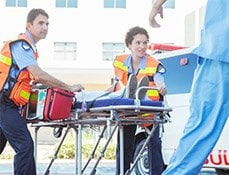Check out our range of private health funds
iSelect does not compare all providers or policies in the market and not all policies or special offers are available at all times, through all channels or in all areas. Not all policies available from our providers are compared by iSelect and due to commercial arrangements and customer circumstances, not all policies compared by iSelect are available to all customers. Learn more.
Health insurance comparison made easy
Easily compare, select and save on health insurance policies
Learn more about Private Health Insurance
Health Insurance Waiting Periods
A waiting period is the time you need to wait before you are allowed to make any claims for benefits on your cover through your health insurance fund. Waiting periods apply for new or increased levels of cover for both hospital and extras cover.
Dental Cover
Avoiding the dentist because of the cost? With extras cover, part of the cost of dental treatments listed in your policy will be covered by your health fund. However, the dental procedures you’re covered for will depend on your fund and policy and are usually subject to an annual limit.
Hospital and Extras Cover
Private hospital cover is health insurance that covers your costs as a private patient while you are in hospital up to the MBS (Medicare Benefit Schedule) fee. Extras cover offers benefits for out-of-hospital treatments which may include dental, physiotherapy and optical.
Family Health Insurance
Families come in all shapes and sizes. Finding a suitable health insurance policy for your family will depend on a variety of factors, including your budget and life stage. Being covered can give you peace of mind should the unexpected happen.
Medicare Levy Surcharge (MLS)
Encouraging Australians to take out private hospital cover, the MLS is an additional 1% to 1.5% tax (on top of the standard 2% Medicare Levy) for those who earn above a certain income and don’t have private hospital cover.
Switching Health Insurance
It’s easy to consider changing health funds if you’re unhappy with the service, but most people don’t consider a regular policy review as their life progresses through different stages.
Frequently Asked Questions
Learn more about the different aspects of private health insurance, from hospital and extras cover, to waiting periods, rebates and surcharges.
Health Insurance & Pregnancy
Thinking of starting a family? It may be worthwhile to learn about the benefits of having private health insurance during your pregnancy. Learn about what’s covered, as well as about important waiting period information in our helpful article.
Your Health Insurance questions answered
What is Private Health Insurance?
Private Health Insurance provides financial cover for all or part of the costs of various health-related treatments and services. Depending on the policy, it can provide cover for treatment as a private patient in a public or private hospital, often allowing you to choose both your doctor and hospital, at a time that suits you.1Department of Health and Aged Care – About private health insurance It can also provide cover for health services not covered by Medicare (such as physiotherapy, optical, and dental).2As above
It functions like other types of insurance, such as Home and Contents or Car Insurance, although rather than being risk based, it’s community based. Community based means that everyone is eligible to receive the same base price for the same policy from any single provider, rather than being rated on their individual health circumstances.3Department of Health And Aged Care – About private health insurance
There are two main types of policies you can take out: Hospital Cover and Extras Cover. These can be purchased separately or combined into a single policy with your health provider. One of the biggest benefits of Private Health Insurance is choice and flexibility.
For example, as a private patient you’re generally given choice of doctor and choice of agreement hospital (hospitals that have agreements with your insurer to either charge you no out-of-pocket expenses or to specify what they’ll be).4Privatehealth.gov.au – Agreement hospitals You also have flexibility over the time of your appointments. In comparison, when you’re treated as a patient in the public system, the appointment times, doctors, and hospitals are typically inflexible, determined by your location and your health concern. Private Health Insurance can also help you avoid the long waiting lists for treatments (provided you’ve served the necessary waiting periods) that can exist in the public system.5Department of Health And Aged Care – About private health insurance
How does Health Insurance work?
Private Health Insurance is divided into two categories: Hospital Cover and General Treatment cover, usually known as Extras Cover. These covers can be purchased separately or as combined policies by most Health Funds, depending on your individual requirements. In some states, a third category known as Ambulance Cover is also available, although this is sometimes included in Hospital Cover or Extras Cover depending on your policy.6Privatehealth.gov.au – Ambulance
As Private Health Insurance is not risk rated, providers can’t refuse to insure any eligible person.7As above They must also charge everyone the same base premium for the same level of cover.8As above Therefore, to help mitigate some of the risk for Health Funds, most treatments incur a waiting period. Waiting periods must be served when you take out a new Private Health Insurance policy, or when you upgrade your policy to include services and treatments not previously covered.
The government sets the maximum waiting periods that Health Funds can impose for hospital treatment. They are:9Private Health Insurance Ombudsman – Waiting periods for private health insurance
- 12 months for pre-existing conditions
- 12 months for obstetrics and IVF
- 2 months for psychiatric care, rehabilitation or palliative care, even for a pre-existing condition
- 2 months in all other circumstances
For Extras Cover, waiting periods are determined by your individual Health Fund, and the length can vary depending on the treatment and your level of cover. If you’ve already served a waiting period for a specific service and switch to a different provider with the same level of cover, the waiting period you’ve served will most likely carry over.
10Department of Health and Aged Care – Waiting periods and exemptions
To receive benefits, you must have a policy that covers the treatment you’re receiving and have served your waiting period. Some clinics and hospitals will be able to automatically apply your benefit by scanning your Health Fund membership card during the payment transaction. In some cases, you may need to make the benefit claim after paying up front, which you can do by contacting your Health Fund directly. How much you have to pay towards your treatment ultimately depends upon your policy and level of cover.
What does Private Health Insurance cover?
What is Excess and ‘the gap’ in Health Insurance?
Excess charges in Health Insurance work similarly to other forms of insurance. It’s an amount that, when taking out your policy, you agree to pay towards your hospital treatment in the event of an in-hospital admission. And, similarly to some types of Car Insurance Policies, you may have the option to increase the cost of your Excess in order to reduce the overall cost of your premium. Depending on your policy, you may be required to pay an Excess every time you are admitted to hospital, or just once per year.
To further clarify, when you are admitted to hospital, Medicare will cover 75% of the Medicare Benefits Schedule (MBS) fee for the treatment you’re receiving.13As aboveProvided you have the appropriate Private Health Insurance Policy and have served your waiting period, your Health Fund will cover the remaining 25%.14As above
While the Australian Government determines the fees for the MBS, they do not set the costs doctors choose to charge for their services, which can lead to additional expenses if your doctor charges above the MBS. This is often referred to as ‘the gap’. Depending on the extent of your hospital stay, further charges may also apply to cover the costs of drugs and pharmaceuticals, dressings and diagnostic tests.
To avoid a large bill for private health patients, some Health Funds offer what is known as ‘Gap Cover’. This means they have agreements with particular doctors which can reduce your gap or potentially avoid it altogether.15Department of Health & Aged Care – Out-of-pocket costs
What is the Private Health Insurance Rebate?
The Private Health Insurance Rebate is provided by the Australian Government to help cover the cost of your premiums for Hospital, Extras, and Ambulance Cover Policies. It’s offered in order to encourage Australians to sign up for Private Health Insurance and subsequently lessen the load on the public healthcare system. For this reason, it’s not applicable to Overseas Visitors Cover.
The rebate is also determined by age and income. If you have a higher income, your rebate entitlement may be reduced, or you may not be entitled to any rebate at all. Couples (including de facto) are subject to a family-based income. The rebate percentage is assessed on 1 April each year, although the income thresholds are currently indexed and will remain the same until 30th June each year.16Australian Government Tax Office – Income thresholds and rates for the private health insurance rebate
If you’re eligible to receive the rebate, there are two ways you can claim. The first is as a premium reduction through your Health Fund, which means you pay less up-front.17Australian Taxation Office – Claiming the private health insurance rebate If you choose this method, it’s your responsibility to nominate the appropriate rebate tier with your provider to avoid a tax liability. Alternatively, you can pay your premium in full throughout the year and receive the rebate as a tax offset when lodging your annual tax return.18As above
Do pensioners need Private Health Insurance?
When retirement age rolls around, most Australians start to consider lowering their expenses. This could include downsizing their homes, reducing the amount of cars they own – and even reducing or cancelling their Private Health Insurance. This is especially true for pensioners who have lived a healthy lifestyle and seldom needed to take advantage of their insurance.
That said, reaching your senior years may be the time you need your private health insurance the most. Getting older leaves you more susceptible to a range of health issues, and while a healthy diet and exercise will certainly help reduce your risk, there are no guarantees. Health Insurance could provide you invaluable peace of mind.
Whether for an injury, an illness or another health ailment, typically the older you are, the more likely you are to need medical treatment. While you’ll have access to the public healthcare system, this could potentially lead to substantial waiting times for treatment depending on the severity of your health concern and where you are located.
If you choose to attend a private hospital without Private Health Insurance, Medicare will still cover 75% of the Medicare Benefits Schedule (MBS) fee for the treatment you’re receiving. However, you’d need to foot the other 25%, along with a myriad of other potential charges depending on the length of your stay and the type of treatment you’re receiving.19Better Health Channel – Hospital costs and payments
There are other benefits to maintaining your Health Insurance as a pensioner as well. If you do require medical treatment, you can skip the waiting lists of the public healthcare system and choose which doctor you want to see.20Department of Health and Aged Care – About private health insurance Depending on your level and type of cover, you’ll also have access to a variety of preventative treatment options.
Best of all, Australians over the age of 65 receive a higher rebate percentage from the government than their younger counterparts, and it increases again once you turn 70.21PrivateHealth.gov.au – Australian Government Private Health Insurance Rebate
Does Medicare cover ambulances?
Ambulance services are not covered by Medicare. Instead, cover varies from state to state.
- ACT: People who live in the ACT and hold a Health Care Concession Card or Full Aged Pensioner Concession Card are entitled to free emergency ambulance services.22Privatehealth.gov.au – AmbulanceIf you’re not eligible for a concession, you can purchase insurance from a Private Health Fund.
- NSW: If you live in NSW and you hold a Health Care Concession Card, Pensioner Concession Card, or Commonwealth Seniors Health Care Card you’re entitled to some free ambulance transport services.23NSW Ambulance – Exemptions from NSW Ambulance Fees
- NT: If you hold a Health Care Card or NT Centrelink Pensioner Concession Card, you are entitled to free ambulance transport services.24Privatehealth.gov.au – Ambulance Otherwise, you can purchase Ambulance Cover from a Private Health Fund or through the state ambulance service.
- QLD: If you’re a Queensland resident, ambulance costs are covered by the state government.25Queensland Government – Interstate Ambulance Treatment and Transport Information for Queensland Residents
- SA: If you’re an SA resident, you can purchase ambulance cover from a Private Health Fund or through the state ambulance service.26SA Ambulance Service – Fees and charges
- TAS: Ambulance costs for Tasmanian residents are usually covered by the state government.27Tasmania Government Department of Health – Ambulance costs if you live in Tasmania
- VIC: If you’re a VIC resident and you hold a Pensioner Concession Card or a Health Care Card, you’re entitled to clinically necessary free ambulance transport services.28Ambulance Victoria – FAQs Otherwise, you can purchase insurance from a Private Health Fund or through the state ambulance service.
- WA: If you’re a WA resident and you hold a Pensioner Concession Card, you’re entitled to free medically necessary ambulance transport services.29Healthy WA – Ambulance fees for senior and pensioners If you’re ineligible, you can purchase insurance from a Private Health Fund or through the state ambulance service.
- All of Australia: People who hold a Veteran Gold Card or a Veteran White Card might be eligible for free emergency ambulance services to their nearest clinical facility and certain non-emergency services might also be covered.30Australia Government: Department of Veterans’ Affairs – Ambulance transport
It’s important to note that if you’re travelling interstate, your cover may vary. For example, residents of Queensland and Tasmania who have free Ambulance Cover in their state may not be covered when in Victoria or another state. So it’s recommended you check with your state ambulance service, concession card provider or Health Fund prior to travelling.
What does ‘no gap’ mean in Health Insurance?
When you have medical treatment that’s listed on the Medicare Benefits Schedule (MBS), Medicare will cover 75% of the fee. If you have the appropriate Private Health Insurance policy, your Health Fund will cover the remaining 25% of the fee.31Department of Health and Aged Care – Hospital cover and product tiers
While the Australian Government sets the MBS fees, they don’t control how much a doctor chooses to charge for their services. In some cases, your doctor may charge above the MBS fee for their services. When this happens, you generally need to pay the difference, which is known as the gap.
Some health funds offer ‘Gap Cover’ as part of their policies. Gap Cover is available when a Health Fund has an agreement in place with a specific doctor, specialist or hospital. This means that some (or all) of their charges above the MBS could get covered by your Health Fund. This can reduce the gap you need to pay – or leave you with no gap to pay – if the treating doctor decides to participate in the program.32PrivateHealth.gov.au – Out of pocket costs
Before you receive medical treatment, it’s recommended you contact your Health Fund to determine whether your doctor is participating in their gap cover arrangements. You should also ask your doctor for an estimate of their costs, as well as whether any other doctors will be involved in your treatment (such as an anaesthetist) and what their charges will be. It’s up to each individual doctor to decide whether they will participate with your fund’s Gap Cover arrangement.
What is Extras Cover in Health Insurance?
Extras Cover, also known as General Treatment Cover or Ancillary Cover, provides insurance that covers some or all the costs of treatment by ancillary health service providers such as dental and optical services. You can combine Extras Cover with your Hospital Cover or choose a separate or stand alone policy, with the same Insurance Provider or another, depending on your individual requirements.
Extras Cover doesn’t have the same product tiers as Hospital Cover, either. There are no classifications, like Bronze, Silver or Gold, that the government sets out for Extras Policies. What you’ll get covered for can vary significantly depending on your provider and the policy you choose.33PrivateHealth.gov.au – What is covered by private health insurance?
Insurers typically offer a range of policies to suit different needs. Some provide extensive coverage and some are more basic. Keep in mind that unlike hospital cover, funds can – and often do – give their extras products unique names (like top, super or starter). But generally they fall into three loose categories – basic, medium or mid and comprehensive.
- Comprehensive Extras: Insurers usually offer policies like these as their highest option, and they often have comparatively high limits. They may cover the following:
- general dental
- major dental
- endodontic
- orthodontic
- optical
- non-PBS pharmaceuticals
- physiotherapy
- podiatry
- psychology
- remedial massage
- Medium or Mid Extras: These policies typically have lower limits than a comprehensive policy, and often include any (or all) of the following:
- general dental
- major dental
- optical
- physiotherapy
- chiropractic
- Basic Extras: All other policies could be considered Basic Extras Cover, with cover for just a few basic services like general dental or physiotherapy, and usually with comparatively low limits.
Just remember that these are only general categories and don’t apply to every insurer. You’ll always want to check the policy document to see exactly what treatments and services are covered.
What does Private Health Insurance cover that Medicare doesn’t?
How can I find the cheapest Health Insurance Policy in Australia?
Shopping around is a good strategy here. Comparing policies from different providers can give you a clear overview of which one has the lowest premiums.
However, keep in mind that a policy with cheaper premiums may not always be cheaper in the long term. A policy with a higher excess might cost you less each month, but when it comes time to claim on that policy you may end up paying much more out of pocket.
Price is also just one consideration among many. It’s also worth thinking about the level of cover you’ll need – whether you want a basic policy or something more comprehensive. This is why it’s important to compare policies with the same level of cover, excesses and benefits. This can give you a better picture of which one offers more value.
Mark Pangrazio
Executive – Commercial, iSelect
Mark is the Executive – Commercial at iSelect. Mark also loves a chat. Ask anyone in the iSelect team and they’ll tell you how you can always stop for a yarn with Mark – whether it’s about work, footy, what you’re up to or the weather. Mark’s also passionate about helping people find the insurance they are looking for at the price point they can afford. He firmly believes that suitable health insurance cover can provide an affordable way for people to have more choices and control of their healthcare. That’s why he loves working with our insurance partners to bring great products to everyday Aussies.
Mark’s top tips to help with the health insurance rate rise
- Understand the price you’re currently paying. This means don’t just set and forget. I know it’s a hassle but dig out your weekly / monthly / annual bill, including any rebates you might be eligible for and get familiar with the costs.
- Understand how you use your health insurance. If you’ve got extras cover consider whether you need all the features you’re paying for. How often do you go to the physio or dentist? If you’ve got a premium extras package but only go to the optometrist once a year, then you may want to consider downgrading to a lower policy.
- Could you be saving money on your premium with a higher excess? Generally speaking, if you opt for a higher excess or co-payment on your policy, you’ll pay a lower premium.
- Understanding the value you’re getting versus the costs you’re paying. Sometimes the cheapest priced plan doesn’t provide the best value. It might be tempting to go with the insurer that offers the lowest premiums, but if their policy inclusions are very limited, you might end up paying a lot more out-of-pocket costs if you were to go to hospital, leaving you financially worse off.
- Consider comparing your health cover to make sure you’re getting a good deal and not paying more than you need to. Some funds may also offer incentives like introductory offers, deals and freebies at certain times of the year. Now might be a good time to shop around. But remember, a good deal or offer doesn’t necessarily mean the cheapest. Make sure the policy is suited to your needs first and foremost.
You might be interested in…

LHC Loading is also know as Lifetime Health Cover Loading and is an initiative brought in by the Federal Government in July 200…
Read More
Ambulance cover can be purchased from your state ambulance authority, or as part of your private health insurance. Learn how it…
Read More
In April 2019, private hospital cover policies were divided into four minimum standard tiers: basic, bronze, silver, and gold….
Read More
Finding suitable health insurance can sometimes be overwhelming. In this article we breakdown some sure-fire tips to help you…
Read More
In this article we discuss some of the private health funds on iSelect’s panel. Keep reading to discover which health fund ma…
Read MoreiSelect does not compare all health insurance providers or policies in the market. The availability of policies will change from time to time. Not all policies available from its providers are compared by iSelect and due to commercial arrangements, your stated needs and circumstances, not all policies compared by iSelect are available to all customers. Some policies and special offers are available only from iSelect’s contact centre or website. Click here to view iSelect’s range of providers
*Based on iSelect data using Adobe Analytics Tracking Tool
We'd love to know what you think of our website so we can improve it!
- 1.
- 2.
- 3.
- 4.
- 5.
- 6.
- 7.
- 8.
- 9.
- 10.
- 11.
- 12.
- 13.
- 14.
- 15.
- 16.
- 17.
- 18.
- 19.
- 20.
- 21.
- 22.
- 23.
- 24.
- 25.
- 26.
- 27.
- 28.
- 29.
- 30.
- 31.
- 32.
- 33.
- 34.
- 35.

.svg)










